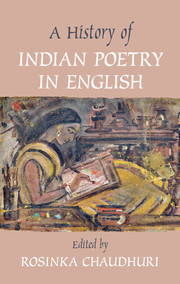Book contents
- Frontmatter
- Contents
- Contributors
- Acknowledgments
- Introduction
- SECTION I THE BROAD NINETEENTH CENTURY: INDIANS IN ENGLISH AND THE ENGLISH IN INDIA
- 1 The First Indian Poet in English: Henry Louis Vivian Derozio
- 2 English Poetry in India: The Early Years
- 3 From Albion's Exile to India's Prodigal Son: The English Poetry of Michael Madhusudan Datta (1824–1873)
- 4 Transforming Late Romanticism, Transforming Home: Women Poets in Colonial India
- 5 The Locations and Dislocations of Toru and Aru Dutt
- 6 Poetry of the Everyday: Comic Verse in the Nineteenth Century
- 7 Toru Dutt and “An Eurasian Poet”
- 8 Rabindranath Translated to Tagore: Gitanjali Song Offerings (1912)
- SECTION II PUBLISHERS, PUBLISHING HOUSES, AND THE PERIODICAL PRESS
- SECTION III POETRY: 1950–2000
- SECTION IV POETS OF THE DIASPORA
- SECTION V THE NEW MILLENNIUM POETS ON THEMSELVES
- Bibliography
- Index
8 - Rabindranath Translated to Tagore: Gitanjali Song Offerings (1912)
from SECTION I - THE BROAD NINETEENTH CENTURY: INDIANS IN ENGLISH AND THE ENGLISH IN INDIA
Published online by Cambridge University Press: 05 March 2016
- Frontmatter
- Contents
- Contributors
- Acknowledgments
- Introduction
- SECTION I THE BROAD NINETEENTH CENTURY: INDIANS IN ENGLISH AND THE ENGLISH IN INDIA
- 1 The First Indian Poet in English: Henry Louis Vivian Derozio
- 2 English Poetry in India: The Early Years
- 3 From Albion's Exile to India's Prodigal Son: The English Poetry of Michael Madhusudan Datta (1824–1873)
- 4 Transforming Late Romanticism, Transforming Home: Women Poets in Colonial India
- 5 The Locations and Dislocations of Toru and Aru Dutt
- 6 Poetry of the Everyday: Comic Verse in the Nineteenth Century
- 7 Toru Dutt and “An Eurasian Poet”
- 8 Rabindranath Translated to Tagore: Gitanjali Song Offerings (1912)
- SECTION II PUBLISHERS, PUBLISHING HOUSES, AND THE PERIODICAL PRESS
- SECTION III POETRY: 1950–2000
- SECTION IV POETS OF THE DIASPORA
- SECTION V THE NEW MILLENNIUM POETS ON THEMSELVES
- Bibliography
- Index
Summary
Almost every account of Rabindranath's English versions of his poems in Gitanjali: Song Offerings (London, 1912) that led to him winning the Nobel Prize the following year begins with story of his discomfort with the English language. It was a story that, like much else in the critical corpus on his work, he himself insisted on shaping from the start. Sisir Kumar Das's magisterial volumes on The English Writings of Rabindranath Tagore open, in Volume One: Poems, with a well-known letter Rabindranath wrote his niece, Indira, in which he reflects on the success of the translations (preceding the Prize). Writing from London on May 6, 1913, he had said, in his original letter:
You have written to me about my English translations of Gitanjali. How I wrote them and why people liked them so much I still cannot quite comprehend. That I cannot write English is such a plain fact that I never had the pride to ever feel ashamed of it. If anybody wrote to me in English inviting me to tea, I didn't have the courage to even write a reply. You're thinking perhaps that I have rid myself of that illusion [māyā] today – absolutely to the contrary – that I have written in English seems to me to be the illusion [māyā]. (My translation)
The translation that Sisir Das used in his volume is different from my translation above, in that in it, crucially, the word māyā, which Rabindranath used twice, was rendered as “delusion.” Now, māyā could certainly imply both delusion and illusion, and in the second instance it works, but the first time he uses the word, in the phrase “māyā kete geche,” it would be better rendered, it seems to me, as “rid myself of that illusion.” The difference lies simply in that the word “delusion” implies fallacy, whose synonyms may include “misconception” or “mistake,” whereas “illusion,” meaning “impression,” seems to take the reader toward pretension, and the getting rid of it thereof, which is what he seems to be gesturing toward over here, coupled as the phrase is with the English social occasion of invitation to tea.
- Type
- Chapter
- Information
- A History of Indian Poetry in English , pp. 130 - 144Publisher: Cambridge University PressPrint publication year: 2016



